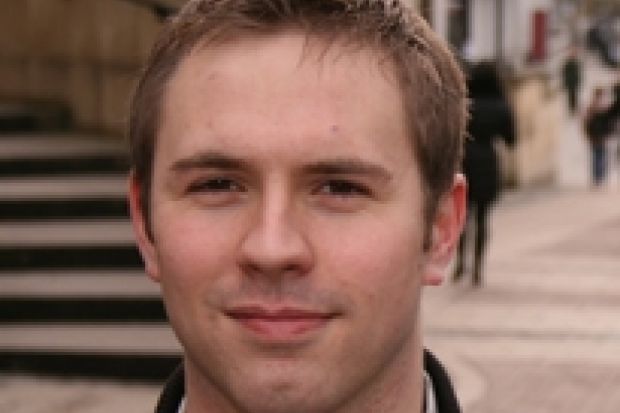Mr Burns, who had been NUS Scotland president, will also oppose any lecturers’ strikes that disrupt exams for final-year students.
He advocates a graduate tax to fund higher education, which is the current NUS policy.
Mr Burns, 26, a physics graduate from Heriot-Watt University, was named as NUS president-elect after a ballot of delegates at the union’s conference in Gateshead today.
Speaking to Times Higher Education before the results were announced, he said his first priority would be “rejecting the idea of students as consumers”.
Mr Burns, a Labour party member, fears that the “ultimate end of consumerism” would be: “We no longer deal with universities on a partnership basis – we deal with litigation.”
He links that stance to his Scottish background.
“A huge advantage coming from Scotland is that I have been insulated from the consumerisation of students,” he said. “To be around student charters, league tables … I’m actually fairly uncomfortable with that. That has given me a fresh eye, a bit more of a challenging outlook.”
His second priority will be “building for the next opportunity we get to dismantle the fees regime”, which he identifies as the next general election.
Mr Burns wants the NUS to ensure that “no party can go into the election without a policy of scrapping the current system”.
He advocates a graduate tax. “Higher education is not a universal service. It is not the NHS, it is not primary education… I do not have a problem with rich graduates contributing something back, but without any price tag approach.”
Price tags dictate students’ choice of university and subject, he argues, and “that is what we need to get rid of”.
His third priority is “bringing our movement back together”. The current president, Aaron Porter, attracted fierce criticism from the student left over a perceived lack of support for protests and occupations, and did not seek re-election.
“I’m quite clear we should be having another national demonstration,” Mr Burns said. His campaign literature called for a demonstration on the first anniversary of Parliament’s passing of the fee rise. “There will be a whole generation paying [£9,000] fees for the first time, a generation who had EMA stolen from them.”
One key issue for students may be strikes by the University and College Union, which is planning for “maximum disruption” of examinations by mounting strikes over pension cuts in May.
Mr Burns pledged “100 per cent support on pensions and job security” for the UCU.
But he added of strikes: “If it affects our final year assessment and ability to graduate, that is off the table. Our members are not pawns to be used in that way.”
Mr Burns stood as an independent, with backing from Labour Students.
